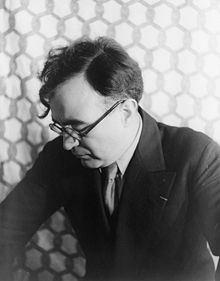Soli III
Template:Use Harvard referencing

Soli III is a work for four soloists and orchestra by Mexican composer Carlos Chávez, written in 1965. Soli is the collective title given to a series of four works, each featuring a succession of solos. The other three compositions in the series are chamber music works, while the present one is a sort of concerto grosso. A performance of the work lasts about sixteen minutes.
The Solis belong to the more "experimental", high-modernist strand of Chávez's compositional output, in contrast to the more traditional character of most of the large-ensemble works. This group of works, which also includes the three Inventions (No. 1 for piano, 1958; No. 2 for string trio, 1965; No. 3 for harp, 1967) and the orchestral compositions Resonancias (1964), Elatio (1967), Discovery, Clio (both 1969), and Initium (1973), features an abstract, atonal musical language based on the principle of non-repetition (Parker 1994, 179; Parker 1998, 11). In the composer's own words, the objective is one of "constant rebirth, of true derivation: a stream that never comes back to its source; a stream of eternal development, like a spiral, always linked to, and continuing, its original source, but always searching for new and unlimited spaces" (Chávez 1961, 84).
History
Soli III was commissioned by the Southwest German Radio (SWR) and was composed in 1965 (Saavedra 2015, 10). The first performance was given in a broadcast by the Southwest German Radio Symphony Orchestra under the composer's direction on 24 November 1965, in the Hans Rosbaud Hall in Baden-Baden (Chávez 1972). The Western Hemisphere premiere was given on the third concert of the Third Inter-American Music Festival in Caracas, Venezuela, on 16 May 1966, by the Philadelphia Orchestra, conducted by Eugene Ormandy. The concert was recorded by Voice of America for possible broadcast, and was archived from the original master tapes to digital preservation master WAV files by the Library of Congress Magnetic Recording Laboratory in 2004. OCLC number 75376442. LCCN 2005650237.
Analysis
The work is scored for four soloists: bassoon, trumpet, viola, and timpani, accompanied by an orchestra consisting of three flutes, three oboes, three clarinets, three bassoons (third doubling contrabassoon), four horns, three trumpets, three trombones, tuba, timpani, three percussionists, piano, two harps, and strings.
In Soli III the principle of featuring soloists in turn is expanded to the form of a concerto grosso or sinfonia concertante, with the soloists accompanied by an orchestra (Parker 1983, 124). Unlike in a concerto grosso, however, the solo instruments do not together constitute a concertino group, but instead each soloist in turn leads a concertante group of related instruments in the orchestra. For example, the first solo group, led by the solo bassoon, features a series of intricate ensembles for a trio of two bassoons and contrabassoon in the orchestra (Lyman n.d.).
References
- Bauer, Amy. 2015. "Non-Repetition and Personal Style in the Inventions and Solis". In Carlos Chávez and His World, edited by Leonora Saavedra, 165–77. Princeton: Princeton University Press. ISBN 978-0-691-16947-7 (cloth); ISBN 978-0-691-16948-4 (pbk).
- Chávez, Carlos. 1961. Musical Thought. The Charles Eliot Norton Lectures, 1958–1959. Cambridge: Harvard University Press. Spanish translation, as El pensamiento musical. Sección de obras de arte. México: Fondo de Cultura Económica, 1979. ISBN 968-16-0082-7.
- Chávez, Carlos. 1972. Untitled liner notes to Chávez Conducted by Carlos Chávez: Soli I, Soli II, Soli IV. LP recording. Odyssey Y31534. New York: Columbia Records.
- Lyman, Jeffrey. n.d. “List of Works” ¡El Bajón en México! project website. Department of Winds & Percussion, University of Michigan (accessed 9 December 2016).
- Parker, Robert L. 1983. Carlos Chávez: Mexico's Modern-Day Orpheus. Boston: Twayne Publishers.
- Parker, Robert L. 1994. "Carlos Chávez's Orchestral Tribute to the Discovery of San Francisco Bay". Latin American Music Review / Revista de Música Latinoamericana 15, no. 2 (Autumn–Winter): 177–88.
- Parker, Robert L. 1998. "A Life's Work". In Robert L. Parker, Carlos Chávez: A Guide to Research, 3–18. Garland Composer Research Manuals 46; Garland Reference Library of the Humanities 1925. New York and London: Garland Publishing, Inc. ISBN 0-8153-2087-6. Reprinted, New York: Routledge, 2013. ISBN 978-1-13559486-2.
- [Saavedra, Leonora]. 2015. "Chronology". Bard Festival 2015: Carlos Chávez and His World: August 7–9 and 13–16, 2015, programme book, 7–11. Annandale-on-Hudson: Bard Publications Office.
